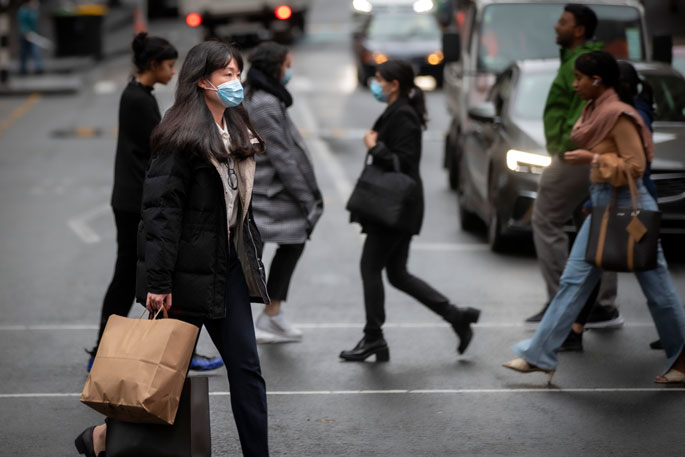An infectious disease expert is warning more needs to be done to raise awareness of RSV, a potentially serious infection in the elderly, as respiratory disease-related hospitalisation rates continue to grow.
Data from government health research agency Institute of Environmental Science and Research (ESR) shows influenza (31 per cent) and respiratory syncytial virus (RSV) (24 per cent) are the most commonly detected respiratory viruses in Auckland hospitals so far this year, with RSV having overtaken Covid-19 (13 per cent) and rhinovirus (22 per cent).
The figures also show the number of hospitalisations from severe respiratory illness in 2024, including acute conditions such as Covid-19, influenza, and RSV, have peaked at levels higher than at any time in almost a decade and the number of acute respiratory admissions since the start of this year exceeds the previous year by 21 per cent.
RSV is a contagious respiratory virus that can affect people of any age, but older adults (60 years and over), infants and those with some underlying conditions are at a greater risk.
Maori, Pacific peoples and those living in lower socioeconomic areas also have a greater risk of hospitalisation from the disease.
Infectious disease specialist Dr Hasan Bhally said globally there had been an underestimation of the burden of RSV.
“I think RSV has suffered from a bit of an identity crisis and its impact has always been understated especially when it comes to adults, as it has primarily been thought of as a disease most likely to impact children.
“While RSV has been recognised as a pathogen since the 1950s and has been around for over half a century, a lot of the RSV and influenza infections disappeared during the COVID pandemic, but they are now back.
“Until recently much of our focus has been on COVID and influenza since 2020. What we have noticed since we started routinely testing for common respiratory viruses in people admitted to hospital was the burden of RSV and we were quite surprised to find this, and it's particularly concerning to see this prevalence, particularly for those aged 65.
“There needs to be greater awareness of the dangers of the disease as it is more often those adults over 65 that are most likely to stay longer in hospital, and more likely to die due to RSV.
“I would put RSV in older adults at a higher risk in terms of complications compared to seasonal influenza. A study has shown that the need for older patients to be admitted and stay in the ICU with RSV is significantly higher than influenza.
Dr Bhally said while RSV is not a complicated virus like Covid which has numerous variants, it can have a devastating impact in certain patient populations and in particular can cause problems beyond the lungs and respiratory system.
“One study quite remarkably showed approximately one-fifth of people hospitalised with RSV aged 50 and over had some effect on their heart, such as acute heart failure.
“Those most at risk with an RSV infection are people aged 65 years of age and in particular with comorbidities like heart failure, COPD or coronary artery disease. People tend to relax if they have a Covid test that is negative but they need to be taking an infection of RSV much more seriously.”
.jpg) Infectious disease specialist Dr Hasan Bhally.
Infectious disease specialist Dr Hasan Bhally.
Dr Bhally said earlier diagnosis of RSV through testing at a community level, including self-testing, could play an intervention role in preventing the spread of RSV in communities and help to address the relatively high mortality rates for older patients who could be treated earlier.
“At a hospital level if we can diagnose and isolate people it prevents others from contracting it as it is a disease that does have high mortality rates among hospitalised older adults and those with comorbidities are also at a greater risk. An outbreak in a hospital creates a huge loss in productivity - with health care workers sick and unable to care for patients, so there are considerable implications for infection control,” he said.
The world’s first respiratory syncytial virus (RSV) vaccine for older adults Arexvy is registered for use in Canada, Australia, the US, the UK, the European Union, Japan and New Zealand. Research shows almost a quarter of US adults aged 60+ have reported receiving a RSV vaccine.
Brett Marett, medical director at GSK NZ said the calls from experts for greater public awareness come ahead of the global RSV Awareness Week, on September 2.
He said the company is working with Pharmac as they review potential funding for the Arexvy vaccine.
“Globally many countries are funding a RSV vaccine ahead of winter so it is important New Zealanders most at risk are able to have funded access also.
“RSV is a major cause of respiratory illness in adults aged 60 and above and there is an ongoing need for more education to ensure the burden of disease is understood in this population.
“We look forward to working with Pharmac as part of their review of funding for the Arexvy vaccine in the coming weeks,” he said.



1 comment
In other news today
Posted on 04-09-2024 08:50 | By Saul
I'll be having cheese on toast lol
Leave a Comment
You must be logged in to make a comment.